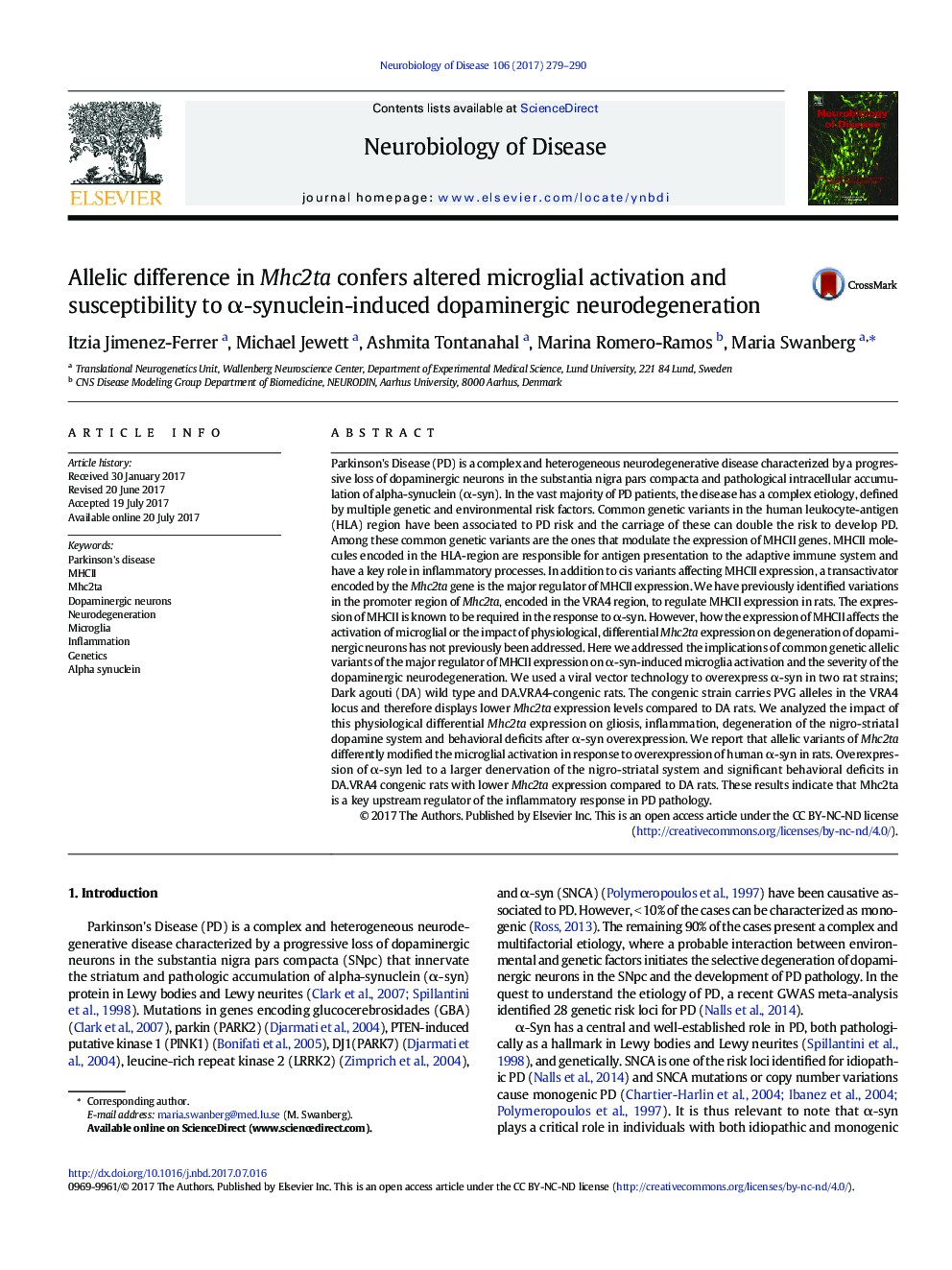| کد مقاله | کد نشریه | سال انتشار | مقاله انگلیسی | نسخه تمام متن |
|---|---|---|---|---|
| 5630604 | 1580615 | 2017 | 12 صفحه PDF | دانلود رایگان |

- This study emphasizes the complexity of neuroinflammation by using an alpha-synuclein-induced rat model for Parkinson's disease (PD).
- The VRA4 locus regulates Mhc2ta and MHCII levels and VRA4 congenic rats offer a model to study the impact of antigen presentation capacity on PD.
- DA.VRA4 rats display an altered microglial phenotype with increased number of MHCII+ cells and more activated microglia.
- The increased activation state of microglia in DA.VRA4 rats is associated with increased dopaminergic pathology and motor deficits.
- The orthologous human gene is associated with MHC2TA and MHCII expression and with susceptibility to inflammatory diseases.
- Neuroinflammation is a key phenotype for PD and MHC2TA should based on our findings be evaluated as a potential therapeutic target.
Parkinson's Disease (PD) is a complex and heterogeneous neurodegenerative disease characterized by a progressive loss of dopaminergic neurons in the substantia nigra pars compacta and pathological intracellular accumulation of alpha-synuclein (α-syn). In the vast majority of PD patients, the disease has a complex etiology, defined by multiple genetic and environmental risk factors. Common genetic variants in the human leukocyte-antigen (HLA) region have been associated to PD risk and the carriage of these can double the risk to develop PD. Among these common genetic variants are the ones that modulate the expression of MHCII genes. MHCII molecules encoded in the HLA-region are responsible for antigen presentation to the adaptive immune system and have a key role in inflammatory processes. In addition to cisâvariants affecting MHCII expression, a transactivator encoded by the Mhc2ta gene is the major regulator of MHCII expression. We have previously identified variations in the promoter region of Mhc2ta, encoded in the VRA4 region, to regulate MHCII expression in rats. The expression of MHCII is known to be required in the response to α-syn. However, how the expression of MHCII affects the activation of microglial or the impact of physiological, differential Mhc2ta expression on degeneration of dopaminergic neurons has not previously been addressed. Here we addressed the implications of common genetic allelic variants of the major regulator of MHCII expression on α-syn-induced microglia activation and the severity of the dopaminergic neurodegeneration. We used a viral vector technology to overexpress α-syn in two rat strains; Dark agouti (DA) wild type and DA.VRA4-congenic rats. The congenic strain carries PVG alleles in the VRA4 locus and therefore displays lower Mhc2ta expression levels compared to DA rats. We analyzed the impact of this physiological differential Mhc2ta expression on gliosis, inflammation, degeneration of the nigro-striatal dopamine system and behavioral deficits after α-syn overexpression. We report that allelic variants of Mhc2ta differently modified the microglial activation in response to overexpression of human α-syn in rats. Overexpression of α-syn led to a larger denervation of the nigro-striatal system and significant behavioral deficits in DA.VRA4 congenic rats with lower Mhc2ta expression compared to DA rats. These results indicate that Mhc2ta is a key upstream regulator of the inflammatory response in PD pathology.
Journal: Neurobiology of Disease - Volume 106, October 2017, Pages 279-290